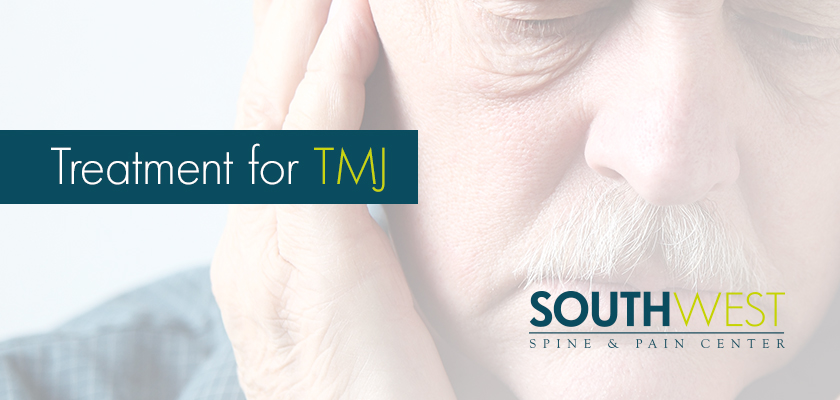
30-Second Blog “Snapshot:”
- The temporomandibular joint works like a hinge by helping your jaw open and close; it connects your jawbone to your skull.
- Temporomandibular joint dysfunction (TMJ) is a condition that causes pain and discomfort to the joint itself, or to the surrounding muscles that control movement.
- The pain management specialists at Southwest Spine and Pain Center explain treatment options for those suffering from TMJ disorders.
Some forms of TMJ, also called lockjaw, may benefit from nonsurgical or surgical treatment; especially if the patient in question is suffering from TMJ caused by arthritis. If you are experiencing jaw pain for any particular reason and are not sure if TMJ is to blame, below are a few signs you may have the condition:
- Pain or tenderness that surrounds the jaw or ears
- Intense, sharp, dull or aching pain that occurs while chewing
- Locking of the temporomandibular joint, making it difficult to open or close the mouth
- Hearing popping sounds or experiencing unusual sensations while opening and closing the mouth
In many cases, the cause of TMJ may not be clear, which can make it somewhat difficult to treatment. Nevertheless, the team at Southwest Spine and Pain Center is fully equipped to evaluate, diagnose and treat TMJ. As alluded to previously, doctors may recommend either a combination of non-surgical treatment options or a surgery to manage TMJ pain.
For mild cases of TMJ, a physician may recommend taking an over-the-counter pain reliever to manage discomfort, as well as practicing certain exercises to stretch and strengthen the muscles surrounding the temporomandibular joint. For more moderate to severe cases, a pain medication, muscle relaxer or sedative may be prescribed to reduce pain. If nighttime teeth grinding and clenching are causing your TMJ, you may benefit from having a mouth guard made by your dentist.
As for interventional pain treatment options, a corticosteroid injection or nerve block may relieve pain and decrease inflammation caused by TMJ. Minimally invasive surgery is usually reserved for individuals with very severe, debilitating cases of TMJ. Surgery typically requires the repair and replacement of the temporomandibular joint. Call Southwest Spine and Pain Center today to discuss treatment options for your TMJ!
If chronic pain is impacting your life, don't wait to schedule an appointment at Southwest Spine and Pain Center. With multiple locations across the state of Utah, the pain management specialists at Southwest Spine and Pain Center are dedicated to helping those who suffer from chronic pain live the life they want to! To schedule an appointment, visit our locations tab!
The advice and information contained in this article is for educational purposes only, and is not intended to replace or counter a physician’s advice or judgment. Please always consult your physician before taking any advice learned here or in any other educational medical material.
